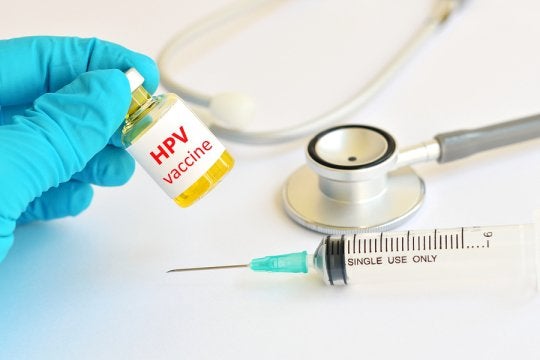-
Starting a Dialog about Birth Control
For many young women, starting a conversation about birth control with a gynecologist is difficult, but the idea of discussing it with a parent seems impossible. However, many young women can benefit from talking to a parent about the birth control pill and other forms of contraception, and bringing it up may not be as scary as you think.
Watch this video for tips for starting a conversation with your mom or dad about birth control. Asking a parent to join you when you visit the gynecologist for a joint conversation or sharing an article about sexual health can be great jumping-off points.
Washington Surgi-Clinic is dedicated to empowering women of all ages to take charge of their sexual health with a comprehensive range of services, from birth control consultations to STD testing, all with complete patient confidentiality. To make an appointment for gynecology services in Washington, D.C., please call (202) 659-9403.
-
A Look at the HPV Vaccine
Human papillomavirus, or HPV, refers to several hundred different types of viruses that can cause skin warts. Approximately 40 HPVs are considered to be sexually transmitted diseases, and of these 40, about 12 are linked with increased risks of different types of cancer. Many times, HPV doesn’t cause any symptoms, so infected people pass it on to their partners without even knowing they have it. Fortunately, the HPV vaccine is now available for young girls and boys and can dramatically decrease future cancer risks for those who receive it. A gynecologist can help you determine if the vaccine is right for your child. These facts will also help.

What is the HPV vaccine?
The HPV vaccine provides protection against four types of sexually transmitted HPV, including those types responsible for approximately 70% of cervical cancer cases and 90% of cases of genital warts. The vaccine also protects against HPV strains that are associated with anal, vaginal, vulvar, penile, and oropharyngeal cancers. HPV vaccines are inactivated, which means that no live viruses are included in the vaccine.
Who should get the vaccine?
For girls, the HPV vaccine should be administered before they become sexually active, so that there is no risk of them having the virus already. A pediatrician or gynecologist may recommend giving the virus to girls between ages 11 and 12, but it is safe for girls as young as nine. Boys can receive a version of the vaccine, called HPV4, between ages nine and 26.
What are the benefits?
The HPV vaccine is not a type of contraception and does not encourage sexual activity, which are fears some parents have. The vaccine simply prevents infections when recipients do become sexually active that could later turn into cancer. According to the American Cancer Institute , nearly all cases of cervical cancer, 95% of anal cancer cases, and 65% of vaginal cancer cases are caused by HPV infections, and a vast majority of these cases could be prevented by the HPV vaccine.
Make an appointment at Washington Surgi-Clinic if you have questions about the HPV vaccine, STD testing, and HPV treatment in Washington, D.C. Please call (202) 659-9403 to schedule your visit.
-
The Benefits of The Morning After Pill
After unintended unprotected intercourse, the morning after pill, or emergency contraception, reduces the risk of an unwanted pregnancy. Morning after pills are simply high-dose birth control pills that prevent pregnancy in the same way birth control pills taken as pre-intercourse conception do, albeit for a short window of time. Although it used to be necessary to get the morning after pill from a gynecologist, it can now be purchased over-the-counter from pharmacies. It can be taken up to three days after unprotected sex, but the earlier it is taken, the more effective it is. If you have had unprotected intercourse and are concerned about an unwanted pregnancy, here is a look at some of the benefits of using the morning after pill.

Non-Invasive
The morning after pill works by preventing the ovary from releasing an egg, so that it prevents a pregnancy from occurring rather than causing a pregnancy to be terminated. This means that the pill is completely non-invasive and does not require a follow-up visit with your gynecologist or any down time. Women who take the morning after pill are able to continue with their normal activities right away.
Effective
When the morning after pill is taken correctly, it reduces the chances of unwanted pregnancy by between 80 and 90%. After taking the morning after pill, about two women in 100 will become pregnant, while approximately eight in 100 women will have a pregnancy after unprotected intercourse without the pill.
Availability
The morning after pill is easily available over-the-counter for men and women over the age of 18. There is no need to wait for a gynecologist appointment, which could reduce the effectiveness of the pill. Easy access means that women can take the pill as soon as possible.
After unprotected sex, in addition to taking steps to prevent pregnancy, you should also undergo STD testing, and when necessary, STD treatment. At Washington Surgi-Clinic, you can undergo STD testing in Washington, D.C. with complete patient confidentiality. To make an appointment, call (202) 659-9403.
Recent Posts
categories
- Uncategorized
- STD
- Washington Surgi-Clinic
- Abortion
- Pregnancy
- Pap Smears
- Birth Control Options
- HPV
- Gynecologist
- Pregnancy Test
- Abortion Safety
- IUD
- Pregnancy Termination
- First Trimister
- Cervical Cancer
- Morning After Pill
- Birth Control Pills
- Chlamydia
- Birth Control Shot
- Gonorrhea
- STD Testing
- Birth Control Implant
- Pelvic Pain
- Birth Control Patch
- HIV
- HPV Vaccine
